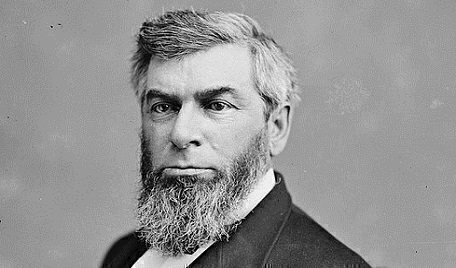[ad_1]
On January 19, 1874, President Ulysses S. Grant nominated little-known Ohio lawyer Morrison Waite to exchange Chief Justice Salmon Chase on the Supreme Court docket, after struggling to discover a nominee for seven months.

Chase, who was an unique member of the Republican Social gathering, was named to the Court docket by President Abraham Lincoln to exchange Roger Taney as Chief Justice of america in 1864. On the information of Chase’s passing on Could 7, 1873, talks had began about President Grant’s selection for Chase’s alternative, who can be the fourth justice throughout Grant’s two phrases in workplace to hitch the Supreme Court docket.
Grant’s choice can be carefully watched after the controversy over his first two appointments. The Republicans had already been accused of “Court docket packing” after including a ninth seat to the bench in 1869, leaving two open seats on the Court docket. Grant’s first two nominees by no means made it to the Court docket. The Senate rejected Ebenezer R. Hoar’s nomination and confirmed Edwin Stanton, however Stanton died earlier than he may turn out to be a Justice. William Sturdy and Joseph Bradley have been then nominated by Grant and confirmed by the Senate in 1870. Ward Hunt adopted as a Grant nominee in 1872.
In June 1873, newspaper hypothesis positioned Waite in a bunch of rumored candidates to exchange Chase. Waite was finest identified for his function in negotiations in Geneva to get $15 million from Nice Britain as reparations associated to the Civil Struggle. Caleb Cushing, a Democrat and former Lawyer Basic, had labored with Morrison on the tribunal. Hypothesis centered on Affiliate Justice Noah Swayne, Affiliate Justice Samuel Miller, Lawyer Basic George H. Williams, Senator Roscoe Conkling, and Senator Oliver Morton as the following Chief Justice.
Grant reportedly supplied the Chief Justice nomination to Conkling and three different potential candidates in November 1873 and was rebuffed. Subsequent, the President formally nominated Lawyer Basic Williams in December 1873. However Grant withdrew the Williams nomination after questions arose about Williams’ {qualifications}. Grant’s second nominee, Cushing, acquired a good report from the Senate Judicial Committee, however Grant withdrew his nomination after 5 days, when allegations emerged that Cushing had corresponded with Jefferson Davis initially of the Civil Struggle.
Waite’s identify had been talked about once more in December 1873 when the Williams nomination was doubtful. The Related Press stated Waite’s nomination caught the Senate abruptly. “Many inquiries have been made as to the standing of this gentleman, he not having a nationwide repute,” it reported on January 20, 1874. The next day, a unanimous Senate confirmed Waite.
Chief Justice Waite served on the Court docket for 14 years, the place he reportedly wrote about 28 p.c of its opinions. Among the many vital opinions he authored was United States v. Cruikshank (1875), which overturned the convictions of three males who killed greater than 100 African-Individuals in what was often known as the Colfax Bloodbath. Waite stated the federal Structure’s First, Second and 14th Amendments didn’t apply to people at a state stage.
One other opinion associated to particular person rights authored by Waite was Minor v. Happersett (1875), which held that the 14th Modification didn’t assure that girls had the proper to vote in elections. “Being unanimously of the opinion that the Structure of america doesn’t confer the proper of suffrage upon anybody, and that the constitutions and legal guidelines of the a number of states which commit that essential belief to males alone aren’t essentially void, we affirm the judgment,” Waite concluded.
Regardless of being in sick well being in his later years, Waite refused to resign from the bench. He died on March 23, 1888 in Washington from pneumonia. Waite’s funeral was held within the chamber of the Home of Representatives
[ad_2]
Source link




